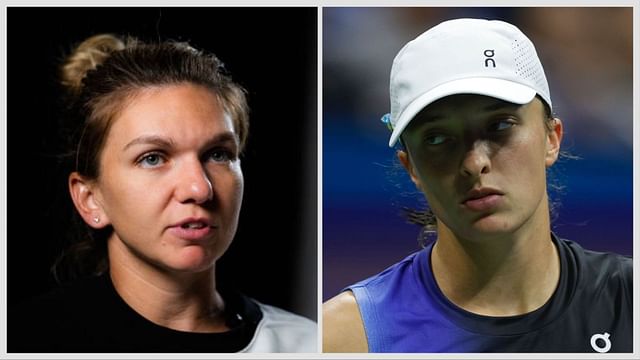
Simona Halep, a former World No. 1 and two-time Grand Slam champion, has not held back her criticism of the differing approaches taken toward her doping suspension and the cases of fellow players Iga Swiatek and Jannik Sinner. Halep, who was handed a four-year suspension after testing positive for Roxadustat during the 2022 US Open, has been vocal about what she perceives as unfair treatment in the handling of her case compared to her peers.
Halep’s suspension was eventually reduced to nine months earlier in 2024 after the Court of Arbitration for Sport (CAS) reviewed her appeal. Having already served the nine-month ban, Halep made her much-anticipated return to professional tennis at the Miami Open. However, her comeback was overshadowed by her frustration over the contrasting resolutions in Swiatek’s and Sinner’s doping cases.
### **Halep Questions the Disparity in Handling Cases**
In a candid interview with *The Telegraph*, Halep openly expressed her confusion and dissatisfaction with the International Tennis Integrity Agency’s (ITIA) handling of her case. The Romanian took issue with how her situation was immediately publicized, subjecting her to intense scrutiny from the media, while the cases of Sinner and Swiatek were kept confidential until they had been resolved.
“What I believe is not fair is that they announced my case straight away, and I got all the heat from the press,” Halep said. “For these two players, they kept it secret, and they just said about the case when everything was done. It’s very weird.”
Halep refrained from directly naming Sinner and Swiatek but made it clear that their cases were her point of comparison. Both players faced doping allegations but were allowed to continue competing during investigations. Sinner’s case is still under review by CAS following the World Anti-Doping Agency’s (WADA) appeal, while Swiatek served a short one-month ban for testing positive for the banned substance trimetazidine. Swiatek’s suspension included a provisional ban, allowing her to return to competition swiftly.
### **The Fight to Play**
Halep also revealed her own unsuccessful attempts to negotiate with authorities to continue playing while awaiting the resolution of her case. She had proposed a system where, if found guilty, she would forfeit any ranking points and prize money earned during the provisional period.
“I asked to lift the provisional suspension to be able to play. I said, ‘If you believe in the end that I am guilty, you take the points back and all the money and everything, but let me play.’ I wanted to keep the rhythm,” she explained. “I asked this two or three times, but now they [Swiatek and Sinner] could play.”
Halep’s plea was denied, leaving her sidelined for nearly a year. She contrasted this with Swiatek, who served a brief suspension, returned to play high-profile events like the WTA Finals and Billie Jean King Cup Finals, and then completed another short suspension.
“The woman player—I don’t want to give the name, but you know who I’m talking about—had a three-week suspension, but then she played two events, and then she again gets suspension. What is this? I mean, I don’t understand,” Halep remarked, her frustration evident. “I feel it is not fair.”
### **Social Media Outburst**
Halep had previously voiced her grievances through a lengthy Instagram post following the announcement of Swiatek’s doping violation. In the post, Halep detailed her personal struggles during her suspension and questioned the apparent disparity in treatment.
“I stand and ask myself, why is there such a big difference in treatment and judgment? I can’t find, and I don’t think there can be, a logical answer. It can only be bad will from ITIA, the organization that has done absolutely everything to destroy me despite the evidence,” Halep wrote.
Halep drew attention to the emotional toll her suspension took on her, describing sleepless nights, anxiety, and an overwhelming sense of injustice. “How is it possible that in identical cases happening around the same time, ITIA has completely different approaches to my detriment?” she questioned. “I lost two years of my career. I lost many nights when I couldn’t sleep—thoughts, anxiety, questions without answers.”
Halep also criticized the WTA and the Players’ Council for their lack of support in restoring her ranking, which plummeted due to her absence from the tour.
### **A Challenging Comeback**
Despite her fiery criticisms, Halep returned to professional tennis in early 2024. However, the Romanian struggled to regain her form, competing in just four tournaments and failing to make a significant impact in any of them. She ended the season ranked World No. 879, a far cry from her glory days as a consistent top-10 player.
The road back to the upper echelons of the sport looks steep for Halep, as she must contend with both the physical and mental toll of her suspension. Nevertheless, her determination to continue competing remains strong.
### **Broader Implications**
Halep’s case highlights a contentious issue in professional tennis: the lack of uniformity in handling doping violations. The disparities in the treatment of Halep, Swiatek, and Sinner have ignited a debate about transparency, fairness, and the role of governing bodies in ensuring consistent application of rules.
For Halep, the fight is not just about her own career but about advocating for equal treatment. “I just want to play and compete on a level playing field,” she said, summing up her stance.
As the tennis world continues to grapple with these issues, one thing is clear: Halep’s voice will not be silenced. Her fight for fairness, both for herself and for others, underscores the broader challenges facing the sport in maintaining its integrity. Whether she can translate her resolve into a successful second act in her career remains to be seen.
Leave a Reply